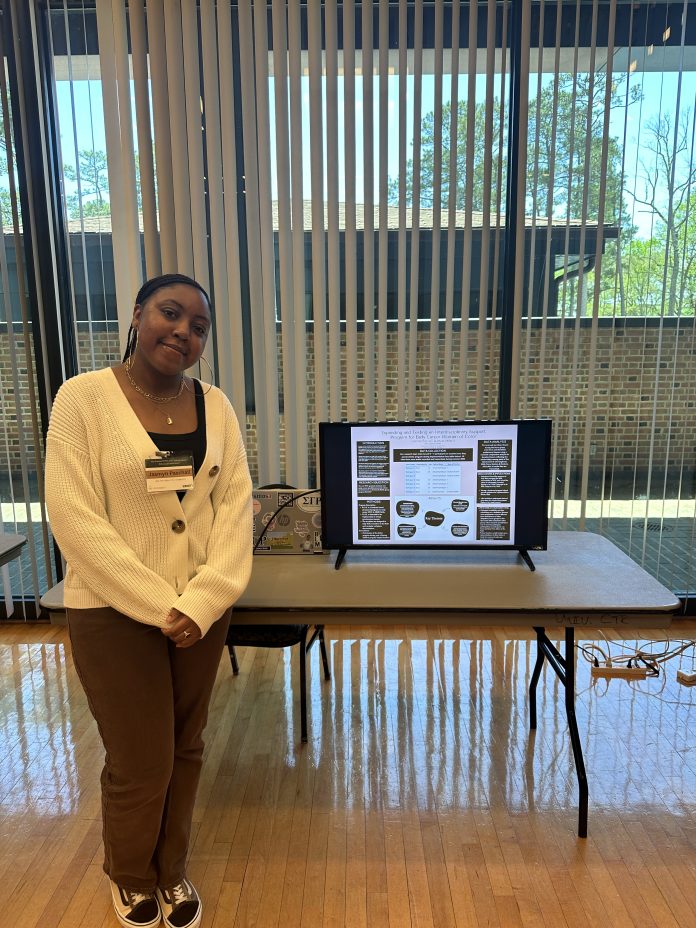Friday, April 12, the College of William and Mary hosted the fourth-annual WMSURE Undergraduate Research Conference in Sadler Center.
The WMSURE program supports William and Mary Scholars — a group of academically distinguished students who participate in undergraduate research, according to the College’s website. The program helps students connect with faculty and staff across the College undertaking research.
In addition to supporting research ambitions, the program provides workshops that equip students with practical life advice such as choosing a major and preparing for graduate school.
Students in the WMSURE program began preparation for their presentations last spring and completed their research over this past summer. After many hours of hard work and dedication, they presented their findings at the conference.
Jasmyn Paschall ’25 presented her findings on early career support for women of color working in mental health fields. Paschall worked in conjunction with the Rise Program, founded by Dr. Janise Parker to monitor the progress of a group of African American women, who had recently entered graduate school.
The Rise Program also provides resources and advice for the women who had just exited graduate school on navigating the workplace as a person of color. Through weekly interviews, Paschall gathered data about the women’s experiences and identified some common themes in their interactions.
“We saw that being in structured programs and affinity groups was helpful for women of color because a lot of them, in their graduate training, faced discrimination and a lack of inclusive training for women of color,” Paschall said.
Following the conclusion of the interviews during the research period, Paschall analyzed the responses to find common themes from the participants in the study group. Paschall’s major findings from her research highlighted the importance of connection within the workplace, preparation for navigating discrimination, mental health self-care strategies and general career advancement tips.
Rida Chaudry ’25 attended the conference to support her classmates’ presentations and enjoyed Paschall’s project. Having taken some classes in the field Paschall focused her research on, Chaudry found Paschall’s findings informative and focused on issues she never spent considerable time learning about.
“I think that it’s so interesting learning about African American Women’s experience in the workplace because I’ve taken a couple of sociology and psychology classes, and that’s one thing that we don’t touch on that much. And so I’m glad that I could have come here and heard that presentation,” Chaudry said.
Ian Doley ’24 conducted his research in conjunction with the Ignite Lab, the College’s Global Health Lab, under the guidance of professor Julius Odhiambo. Doley’s research aimed to quantify the anemia burden among women of reproductive age in Rwanda.
Using demographic and health survey data available for many countries around the world, Doley sought to identify specific variables highly associated with anemia positivity. Using chi-squared analysis and regression modeling, Doley identified three major factors related to women in Rwanda being diagnosed with anemia.
“When I did regression analysis, I got three variables that came up as being significant. So, it was employment status, those who were working were less likely to have anemia. Those that perceived that the distance to a health facility as not a big problem, were also less likely to have anemia. And then finally, if the sex of the household was a male, there was also a decreased likelihood of anemia,” Doley said.
In addition to these three major factors, Doley also sought to examine if location was a factor in the concentrations of anemia within Rwanda. Using the demographic and health survey data and R to create a visual model, Doley found that the anemia burden is disproportionately concentrated in the southwest region of Rwanda.
He hopes to use these findings to inform future policy decisions regarding equitable resource allocation to the southwest region of Rwanda. He aims to finish authoring a report on his findings and submit them for publication in a journal.
Melanie Jimenez ’26 attended the conference as she was interested to see what other research students are undertaking. Jimenez, a biology major, frequently participates in biology research doing lots of wet-cell work. Jimenez learned about Doley’s project and found it very eye-opening and quite different from the research she undertakes.
“It was something very different from the wet lab scenario, in which you sort of forget about the human aspect of things and the interactions people have with different communities and how engaging they are in actually uplifting people,” Jimenez said.





























